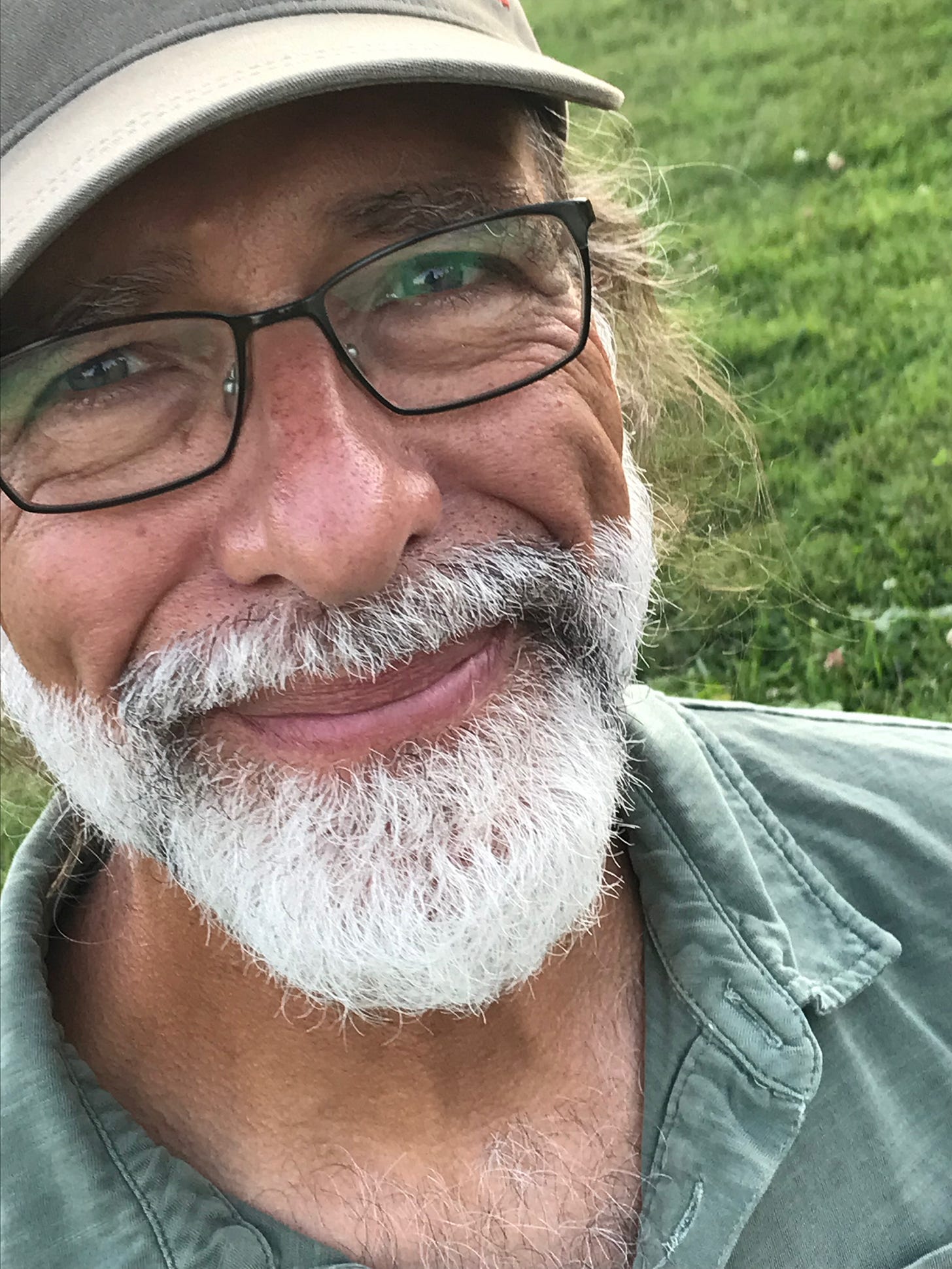A Monster Truck CRUSHES My Pride
Angry Army Buddies, Truculent Trucks, and a bit of Mindful Awareness
“What are you, crazy?” I said to my friend, Robert. We were sitting in the open front seat of a U.S. Army M35 2-1/2-ton supply truck (a Deuce-n-Half, in military slang), which we’d parked by a hillside in the desert landscape of California’s Fort Irwin National Training Center, hoping but failing to find some relief from the hot sun. Snacking on leftover MREs* and awaiting radioed coordinates from our platoon sergeant before moving to the next location, we were happy for a chance to relax for a few minutes. This was back in 1985. Along with the rest of our Colorado-based Army Infantry unit, Robert and I were participating in a six-week training course at the NTC military base in the Mojave Desert, where we engaged in mock ground wars against the training facility’s “opposing force.”
I’d just asked Robert about his plans for the future, and he’d shared his desire to re-enlist. I hated the Army and couldn’t fathom why anyone would sign up for a second hitch, especially Robert, whom I considered one of the more sensitive and thoughtful soldiers I’d met in the infantry. Someone I assumed I could relate to. I felt disappointed.
In response to my insensitive comment, Robert’s expression went cold. “You know, not everyone is having the same experience as you,” he snapped. Our conversation was over.
I mention this memory now, thirty-nine years later, because it was an early lesson in humility, one that has remained with me all of my life. Of course, at the time, my hurt feelings were my main concern. I turned away to nurse those, and we carried on with our mission. It was only later that I understood that I had hurt his feelings. I had projected my opinions onto him, rather than seeing him for who he was. And that’s all anyone really wants. To be seen, acknowledged, understood. Nobody likes or deserves to be judged.
The other day, I was driving home from running some errands in my neighboring town of South Yarmouth when I saw a monster truck in front of the showroom at a used-car dealership. I shook my head. Stupid, I thought as I drove by. And my opinion wasn’t reserved only for the truck. Why would anyone even like those things?
But I actually checked that response pretty quickly, and laughed at myself as I turned onto the Route 6 on-ramp to Hyannis. You’re still judging people, Don, after all these years, even after the last five years of practicing mindfulness meditation.
But that’s the thing about a mindfulness practice. Its purpose is not to “get rid” of negative characteristics, creating in the mind a battlefield of good against evil. As long as we think of our tendency to judge as “bad” we are going to continue to feel badly about ourselves whenever we yield to that impulse. Judgement is judgment; it is what it is. Mindfulness simply helps us to become aware of it. To not fall victim to it every time it pronounces itself.
When we are not aware of the way our minds work then when we do pass judgment on somebody or something, we are completely fooled by it, mistaking our feelings for fact (for this essay, I’m sticking to the subject of judgment, but any negative quality can be substituted: anger, fear, anxiety, jealousy, etc). So, for example, if I see a monster truck and I think, that’s ridiculous, then, in my ignorance, I likely won’t stop there: What kind of insecure fool would waste time and money on such a thing? What kind of a mixed up, aggressive world do we live in? I imagine the owner of a monster truck, or of any truck lifted and tricked out beyond any useful purpose, as someone who is trying to prove something. As someone I probably wouldn’t like. With these small-minded thoughts, how many tens of thousands of human beings have I just dismissed as beneath me, as not worth my time?
It is my mindfulness practice that helps me to observe and reflect on these inner mechanisms; to understand the fragility of the “self” and how it needs propping up in order to believe in its own legitimacy. Judging—comparing oneself favorably to others—is one of the ways in which the illusory self creates a veil of solidity. If I am better than others then I know I exist, I know I matter. I am comforted in believing that, because I stand out, I am not a meaningless speck of dust on this tiny planet in this vast universe. I need that pronounced proof, that feeling of uniqueness, of being special in some way, and the easiest way to gain that feeling is by exerting my superiority. By dissing on others.
But ultimately, the method leads to unhappiness. And that is another perk of a mindfulness practice. Buddhists speak of “wholesome” and “unwholesome” thoughts, not in the context of moral codes that must be followed, as if one could actually banish an unwholesome thought from the mind (try to not think of an elephant), but rather as a method of understanding which thoughts lead to wellbeing and which to suffering. Meditation, creating some quiet space from which one can see one’s own thought process, is the key. That quiet space can extend throughout our day. So, when we find ourselves becoming judgmental, we just observe that. We don’t condemn ourselves for it. But we do look closely in order to understand these feelings, emotions, and tendencies more clearly. Where do they come from and where are they leading? Who are they serving and in what way? What are the consequences? Who gets hurt by them? We follow it through, asking ourselves if we really are happier now that we believe ourselves to be better than someone else.

Buddhist-informed mindfulness teachings are “try and see” methods, not requiring blind faith in something unprovable or adherence to some random organization’s standards of right and wrong. That’s what I really like about the practice. We take the time to look closely at the true nature of reality and our own sense of self, and go from there. Compassion comes about from understanding, not from worship or compliance.
Because I am willing to forgive myself for judging others, and to understand why I judge in the first place, that unwholesome habit tends to ease and abate naturally, and I find myself hoping that my old Army buddy has found his best path, even if it was a career in the military, and I find myself hoping that whoever buys that monster truck in South Yarmouth enjoys their new hobby as much as I enjoy writing, woodworking, and nature.
As Robert stated so long ago in that Deuce-n-Half in the hot desert, not everyone is having the same experience as me.
____________________________
Thank you for reading Shy Guy Meets the Buddha: Reflections on Work, Love, and Nature. If you enjoy these mindfulness-themed biographical essays and would like to show your support, please consider becoming a supporting member for only $5 a month. Alternatively, a one-time donation will help me continue the hard work behind these creative efforts; you can “Buy me a coffee” by clicking the button below. “Liking,” sharing, and commenting will also help promote my newsletter. Please take a few moments to show you care. Thank you! 💚
*MRE: Meal, Ready-to-Eat
*Since I mentioned my friend Paula Wittner, I figured I’d include a link to her work and museum. You haven’t seen art like this! ❤️









Wow, this is great. The choice between being right and being at peace. Our egoic self wants to be right but then somebody else has to be wrong, which means there's conflict. By allowing others and ourselves to have our unique experience without judgement, we can be at peace. Harder said then done, but I think making the effort in the first place is already a big part of the work :)
I really really like how you emphasise awareness instead of rushing to condemn or get rid of an emotion. 💙